Corruption and fraud beset long-delayed L.A. Valley college theater project, lawsuit alleges
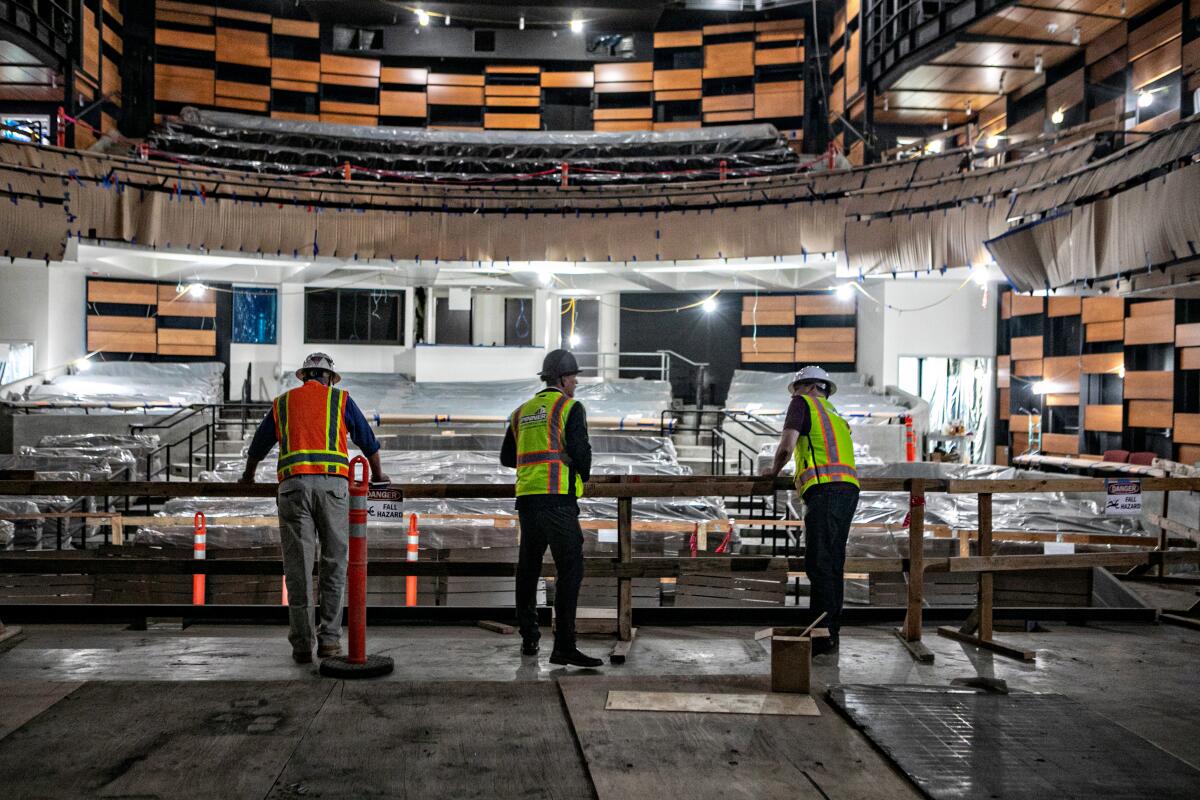
- Share via
It’s billed as one of the most expansive theater and media arts spaces among community colleges in California. The sleek new center at Los Angeles Valley College will have four indoor theaters, an outdoor amphitheater, classrooms, a newsroom, a radio station and faculty offices across 103,000 square feet of glass, steel, concrete and wood.
The $82-million center will enrich the education of Valley students — who are largely low-income and the first in their families to attend college — with marketable skills for the region’s creative industries and provide intimate performing spaces for the diverse artistic community, according to Jennifer Read, chair of the college’s theater department.
But since its 2016 groundbreaking, the project has been beset with troubles. It’s four years behind schedule. It has racked up $12 million in unanticipated costs. After prolonged arguments over who is to blame, an independent arbitrator concluded in April that the Los Angeles Community College District was primarily at fault for the delays and violated state requirements for “good faith and fair dealing” in construction contracts. The arbitrator ordered the district to pay $3.2 million in compensation to Pinner Construction Inc. and its subcontractors, according to the arbitration report obtained by the Times.
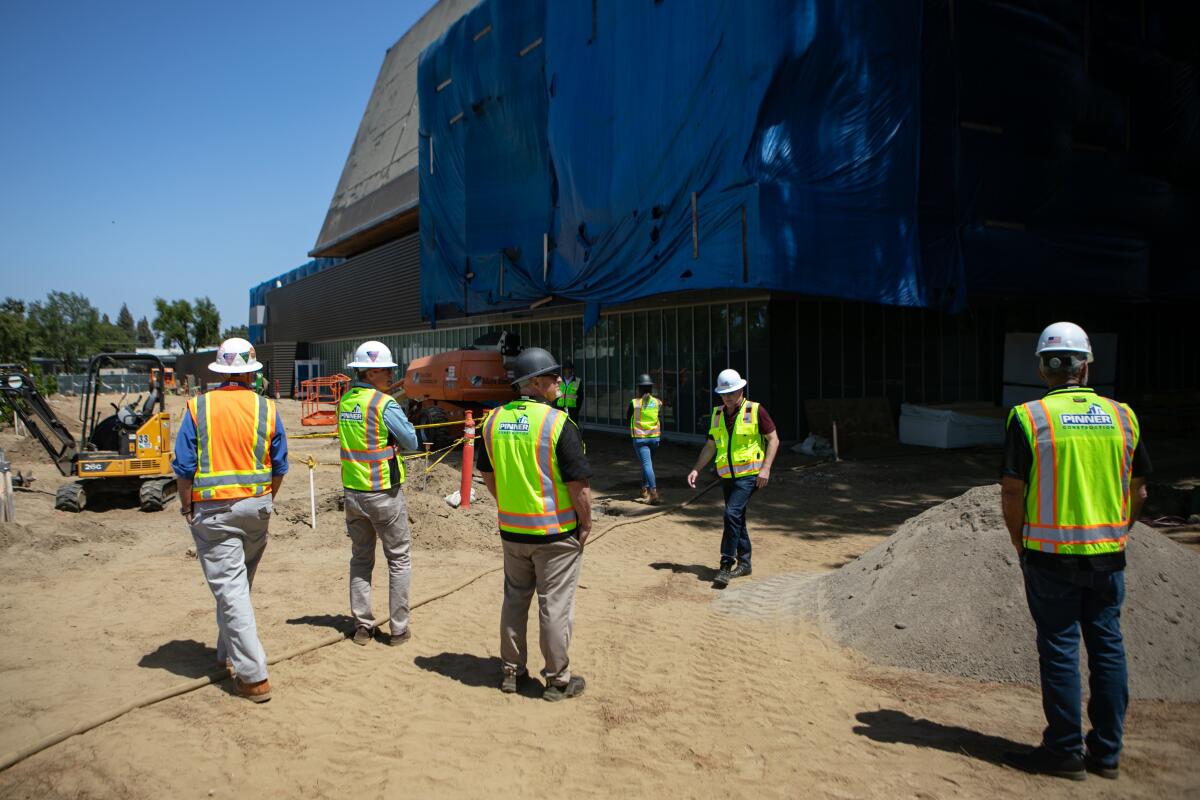
In a lawsuit filed Tuesday in Los Angeles County Superior Court, Pinner and two subcontractors have accused the L.A. district’s project team of fraud, corruption and racketeering in conspiring to delay the theater’s construction so consultants could garner more billable hours.
The complaint alleges that taxpayers shelled out $20 million in unjustified payments and that Pinner and its subcontractors were forced to spend more than $24.8 million for extra construction costs, overhead, consultant and legal fees, and other expenses. In the lawsuit, Pinner is demanding that the district remove its consultants, including college project director Mark Strauss, senior vice president of DACM Project Management Inc.
“Acting in concert, RACKETEERS maliciously conspired to delay the Project, blame it on PINNER and earn millions of additional dollars in the process,” the complaint alleges. “These consultants … must be brought to justice and held accountable.”
Strauss declined to comment, referring questions to the L.A. district. The district declined to respond to questions about the lawsuit or arbitration finding because, a spokesman said, officials were busy with a board meeting Wednesday.
Contacted outside the meeting, board President Gabriel Buelna said: “I trust our staff. People file lawsuits. We can’t comment on them.”
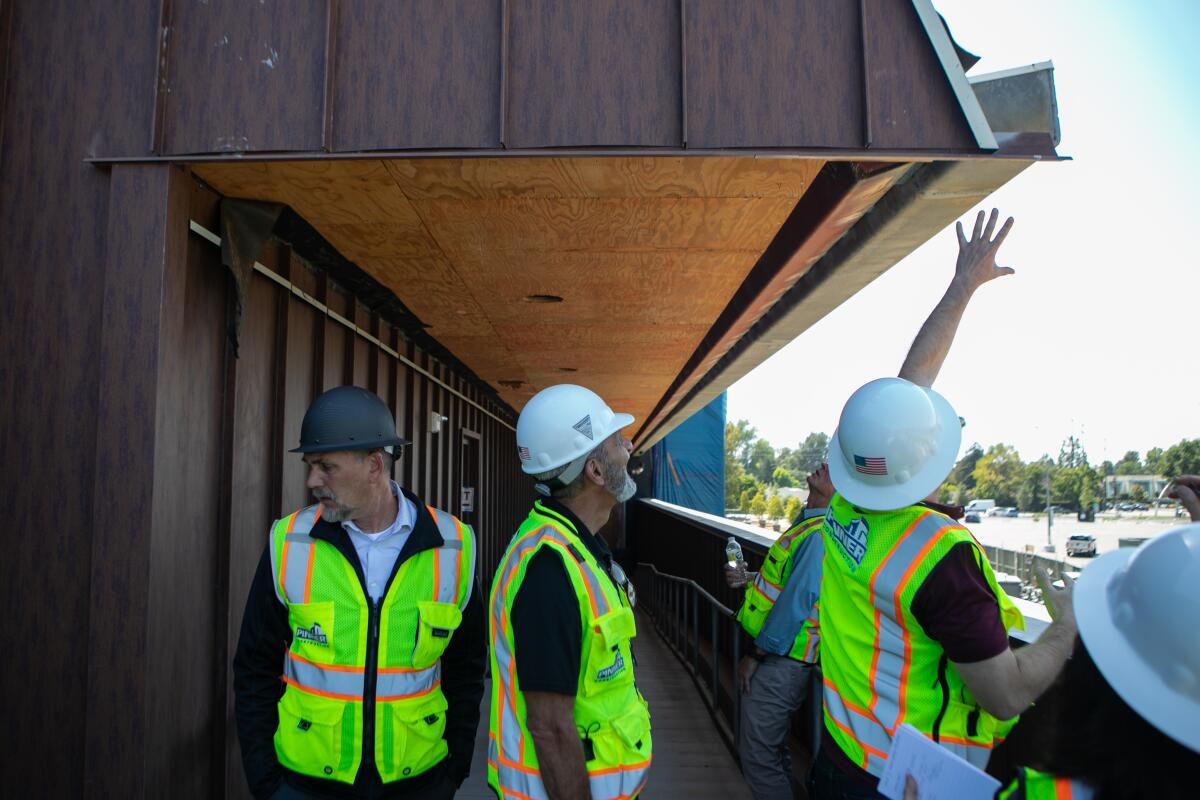
The district, which educates 220,000 students on nine campuses in the largest community college system in the nation, has long been embroiled in controversy over its massive construction program. That program has been funded by four separate construction bond measures totaling $9.5 billion approved by voters since 2001. The district’s Board of Trustees voted last month to place a $5.3-billion bond measure — its largest ever — on the November ballot.
In 2011, The Times documented financial waste, nepotism and mismanagement in several district projects funded with bond measures. District Chancellor Francisco Rodriguez has said that reforms launched since then, including an independent bond monitor, have prevented mismanagement from recurring.
But in 2019, Rodriguez fired the district’s chief facilities executive, David Salazar, after he raised red flags about cost overruns in the $3.3-billion construction bond program that voters had approved in 2016.
In his performance evaluation of Salazar, Rodriguez rated him highly in nine of 12 categories including accomplishments, job knowledge and problem solving, but said the executive’s leadership, communication and judgment fell short, resulting in “diminished confidence” in him among trustees and an overall evaluation of unsatisfactory. Salazar in turn filed a whistleblower complaint, alleging retaliation for outing problems in the program, but it was dismissed by the district’s bond monitor.
Three years later, L.A. Valley College is at the center of the lawsuit by the project’s construction firm.
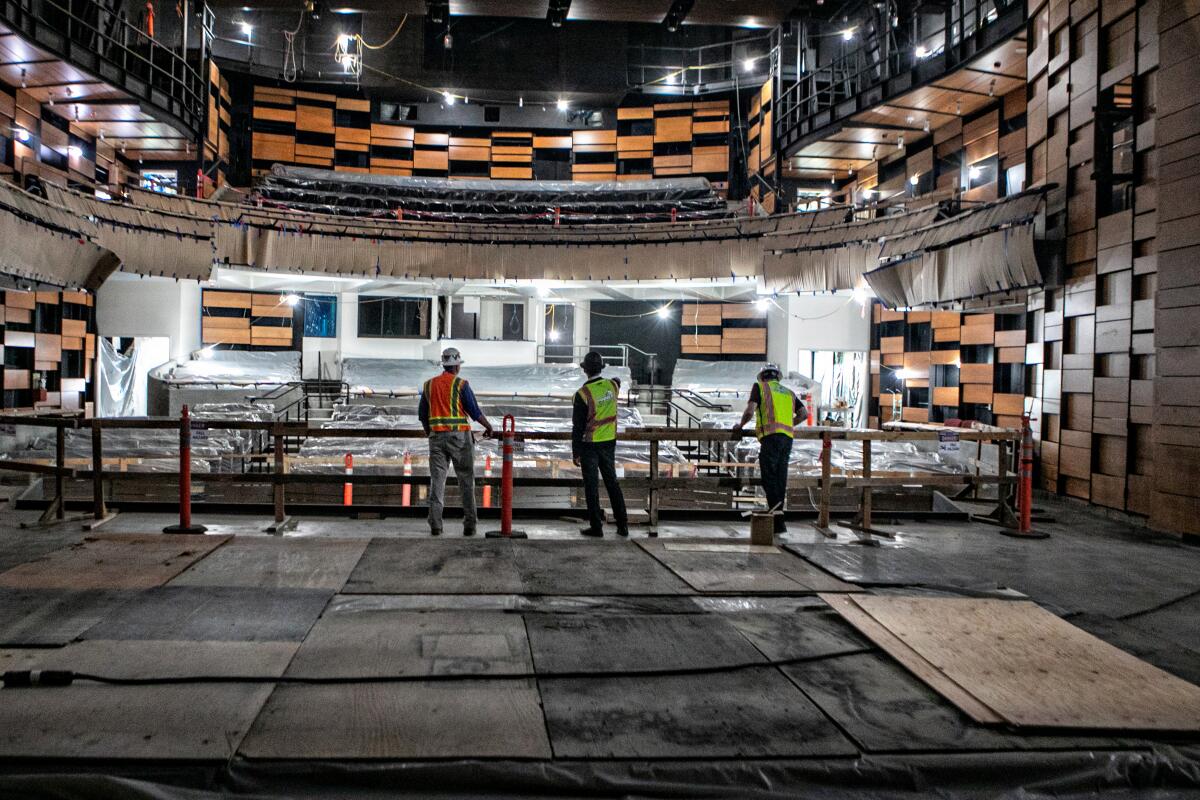
The project, called the Valley Academic & Cultural Center, will bring the theater arts and media arts departments into a single complex. Among the college’s 18,000 students, only 35 to 40 of them are currently majoring in theater — one-third the number a decade ago — although more than 100 students in other disciplines take performing arts classes, Read said.
Additional students are majoring in media arts, broadcasting, journalism and photography, but enrollment numbers were not immediately available from college officials.
In past board discussions, previous trustees questioned the scope of the project for the relatively small performing and media arts programs. But Read said she hopes the new complex will attract more students and broadly serve the region’s artists by providing more intimate places to perform than the nearby 1700-seat Soraya theater at Cal State Northridge.
“If you build it, they will come,” Read said, adding that she aspires to expand from the classic theatrical canon of Shakespeare and Ibsen to build in more multicultural programming, including Chicano and Black theater classes.
The project, originally slated to open in 2018, has been substantially delayed.
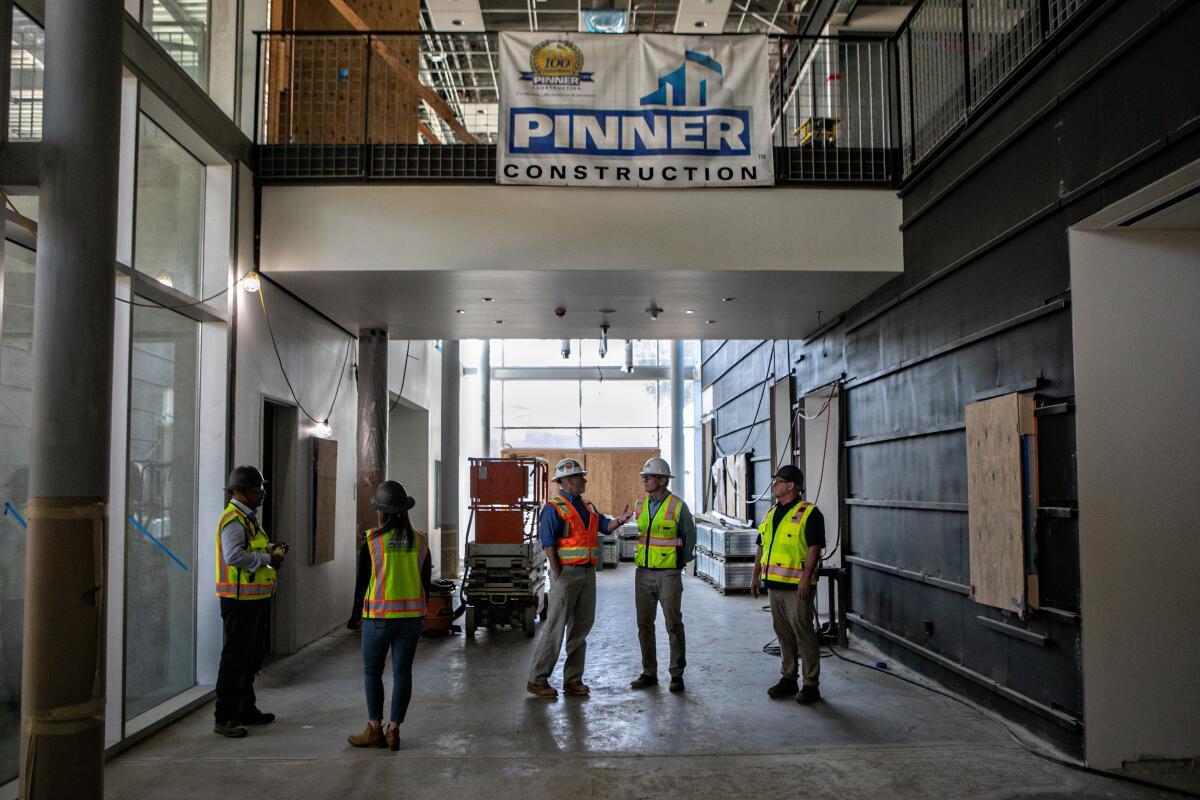
An illustration of the project’s multiple problems lies inside the main 430-seat theater, a soaring space that rises 80 feet high. Behind its concrete and wood-paneled walls is an enormous structure of interwoven reinforcing steel so heavy and tall that Pinner’s team had to build a massive wooden frame around it to hold it up, Newt Kellam, the firm’s chief administrative officer said in an interview.
Pinner wanted to use shorter pieces of reinforcing steel no taller than 20 feet — which the arbitrator agreed was standard industry practice. But the district’s project managers barred that plan and forced the firm to use pieces nearly three times higher and build the supporting structure for it.
The consultants insisted on the unusual design despite warnings from Pinner that it would delay the project for about 13 months and increase costs by $16 million, Kellam said. The firm’s lawsuit alleges that the consultants deliberately misled district trustees and officials about the issue of splicing, or joining, of vertical steel and that disagreements over it resulted in a 15-month delay and $2.5 million in additional compensation paid to consultants.
“It’s so overbuilt, it’s like a bomb shelter,” said Robert Boyington, Pinner’s project executive, during a recent tour of the site.
Deborah S. Ballati of JAMS, a private arbitration firm chosen by Pinner and the district to settle their differences, found multiple management failures by college consultants. She said the district’s team insisted that the state architect had to greenlight the splicing requested by Pinner but failed to seek approval even though the estimated costs and time to do so were not excessive.
The consultants’ response to Pinner’s requests for information about various design issues — more than 2,700, well above the industry norm for a project of this size — were “often late and incomplete, further exacerbating the design issues,” Ballati found. She rejected the district’s arguments that the contract documents clearly barred splicing, saying Pinner was right to assume otherwise in developing its project timeline and budget.
In another construction dispute, the district’s consultants are ordering Pinner to tear down exterior panels, which were installed in 2018 on part of the building amid more than 40 inspections by various state and district officials, said Dirk Griffin, Pinner’s chief executive officer.
The lawsuit alleges that the district‘s team is ordering Pinner to rework the job and instead install the panels in a way that is different from instructions by the manufacturer, Trespa — which would void the warranty for them — and from how the panels have been installed on other L.A. Valley campus buildings in the past.
The problems with the exterior panels, audiovisual equipment and door hardware that have surfaced since September could delay the project 200 more days and result in more than $1 million in additional compensation to the consultants, the lawsuit alleges.
Times staff writer Debbie Truong contributed to this report.
More to Read
Sign up for Essential California
The most important California stories and recommendations in your inbox every morning.
You may occasionally receive promotional content from the Los Angeles Times.














